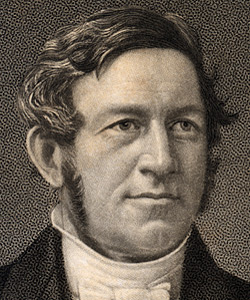Great Throughts Treasury
This site is dedicated to the memory of Dr. Alan William Smolowe who gave birth to the creation of this database.

Erskine Mason
American Clergy
"They that deserve nothing should be content with anything... If we cannot bring our condition to our mind, we must bring our mind to our condition; if a man is not content in the state he is in, he will not be content in the state he would be in."
"God has so constituted our nature that we cannot be happy unless we are, or think we are, the means of good to others.—We can scarcely conceive of greater wretchedness than must be felt by him who knows he is wholly useless in the world."
"A life of passionate gratification is not to be compared with a life of active benevolence. God has so constituted our nature that a man cannot be happy unless he is, or thinks he is, a means of good. Judging from our own experience, we cannot conceive of a picture of more unutterable wretchedness than is furnished by one who knows that he is wholly useless in the world."
"For we may ask in return, what has any secret purpose to do with our role of judgment and action? “Secret things,” we are told, “belong unto the Lord our God; but things which are revealed, unto us and to our children.” The question taken from the hidden purposes of the divine mind, can have no force whatever, because it is an appeal to our ignorance. We know, and can know nothing about them. One thing, however, we do know. God must be always and everywhere consistent with himself; and whether we can understand it or not, it is certain that there can be no inconsistency between revealed and unrevealed truths; and if God has made an offer of eternal life through the atonement unto all men, and commanded all men to embrace it, there cannot be in any purpose of God concerning its nature, anything which will clash with, and so contradict this universal offer."
"I cannot believe that God would make to a sinner in his wants and his woes the tender of a relief which did not exist, or which he did not wish him to embrace; I cannot believe that God would command his creatures to embrace a provision which had never been made for them, or sanction by the peril of one’s everlasting interests a commandment which he never meant should be obeyed, and which itself precluded the possibility of obedience."
"There is no more waste in preaching, than there has been in making an. atonement which is not received. The precious seed which, Sabbath after Sabbath, is thrown out upon the moral desert, which resists and sets at naught all the diligence of the husbandman, is not lost. It will bring forth fruit–the broad field upon which at last shall be gathered the sublime, and awful, and mysterious, and stirring magnificence of the end, is white unto the harvest. Every grain is there giving produce–every particle of gospel truth springs up and waves on that awful field. I preach for a testimony–oh! it is in feebleness I speak. I cannot throw might into my language. I cannot breathe words which shall take a lasting form and substance, and fall upon my worldly-minded hearers–but yet they die not. I seem already to hear their reverberation from a thousand echoes, louder and louder, and deeper and deeper, responding to the anthems of the saved, or the bitter and deep toned knell which shall be rung over lost spirits. God prepare us, my brethren, for the end."
"And now, if you still press the question, why should God make provision for forgiveness, to an extent he knew would be unnecessary, and be guilty of an expenditure of means beyond what the well-known circumstances of the case required, We answer, by referring you to the characteristic of universality, to which we have already adverted, as marking his dispensations in the natural world, and ask you why his sun shines and wastes its beams upon sightless eye-balls, or upon those who will not open their eyes to behold his goodly rays? Why does he send his rains upon the barren rock, or waste his showers upon the sandy and sterile soil, in which the seed can never vegetate? If I propose this question, you tell me in reply, that I mistake altogether the nature of God’s creations, and the general principles of the system which he has established. You tell me that the necessity for the sun being what it is, does not depend upon the number of the persons who are to be enlightened by his rays, but grows out of the fact that it must be what it is to give light to any one–that atmospheric laws are general, and cannot in their nature be so arranged as to secure the descent of rain only where it will render the earth productive. You cannot consider that there is any waste of light or moisture, because there are some who do not see, or because in some places the surface of the earth presents the impervious rock to the rains of heaven."